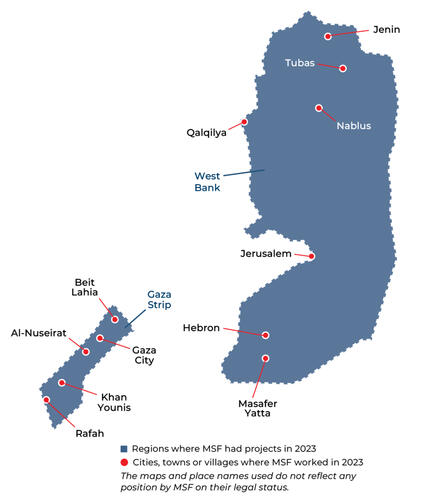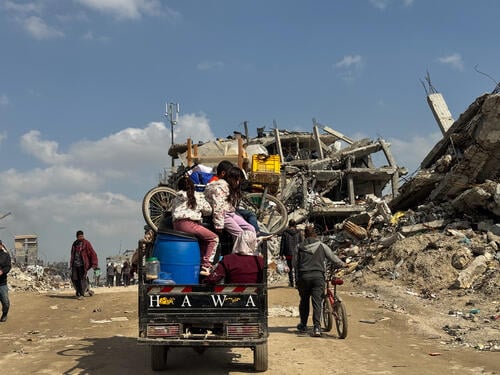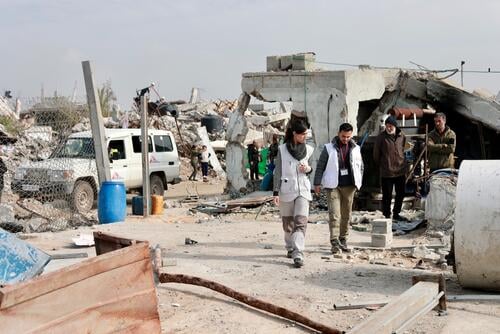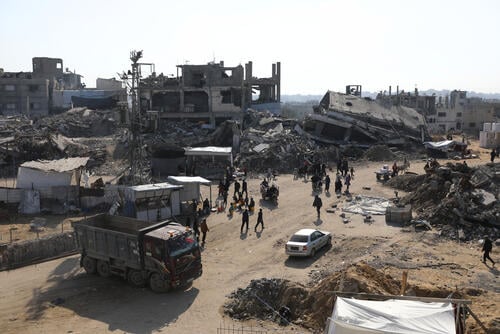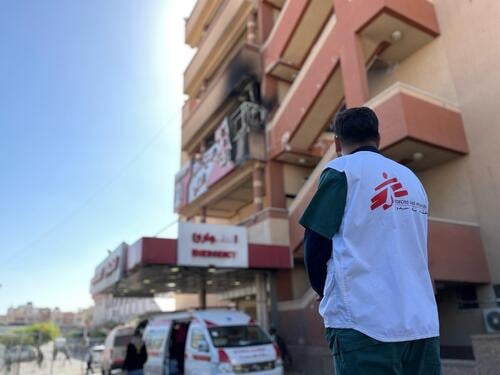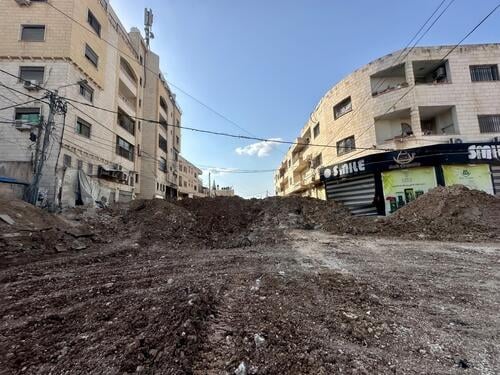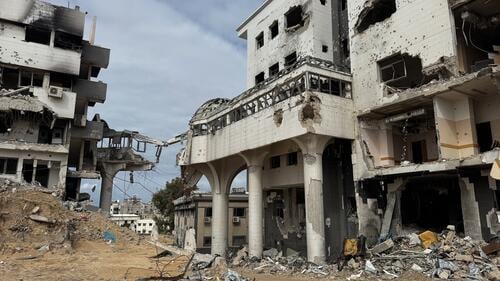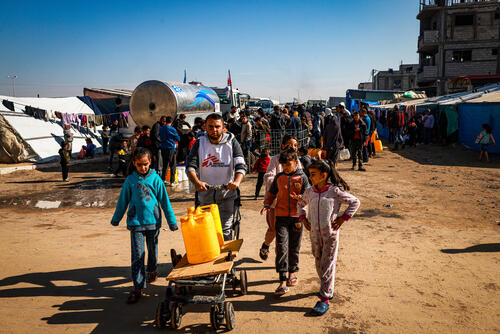Gaza
During the first three-quarters of 2023, our teams continued to deliver specialised medical services in the Gaza Strip, a 40-kilometre-long enclaved area that has now endured more than 15 years of Israeli-Egyptian blockade. Our teams offered support to the overstretched local healthcare system through three hospitals and various outpatient clinics located in different parts of the Strip, as well as the main laboratory, which ran microbiological analysis services for both MSF and non-MSF facilities.
Activities managed by our teams up to that point included comprehensive care for burns and trauma patients, comprising surgery, physiotherapy, psychological support, occupational therapy and health education.
Everything changed on 7 October, when Israel launched its heaviest, most lethal offensive ever on Palestine, following Hamas’ deadly attacks on Israeli soil on the same day. Days of intense, indiscriminate bombing on the Gaza Strip turned into weeks, particularly in the north of the Strip, and MSF teams struggled to keep medical activities up and running while ensuring their own safety.
The situation soon forced the evacuation of our international staff to the south of the Strip, where they were blocked for weeks, before being permitted to leave via the Rafah border. Most of our Palestinian personnel continued to work under imminent threat to their lives, doing their best to provide care in these extreme circumstances. The already strained healthcare system crumbled under the Israeli attack, and hospitals in Gaza City were overwhelmed with patients and people seeking refuge. First-hand observation by MSF teams confirmed that women, children and elderly people represented a very large proportion of the dead and the wounded.
The situation was made even more unbearable by the complete siege of the Strip by the Israeli authorities, who took many weeks to allow food, medical materials, drugs and humanitarian aid into Gaza. Once they did, the amounts permitted were so negligible that they fell far short of people’s needs. Surgeons were reduced to operating on patients without anaesthetics, and emergency care became more and more difficult to perform, while treatment for any conditions that were not immediately life-threatening effectively stopped.
MSF’s social mission includes bearing witness to what we see, and early on in the conflict, we made repeated public calls for a lasting ceasefire as the only meaningful way to spare civilian lives in Gaza. However, the situation quickly worsened, as it became clear that healthcare facilities were themselves coming under attack, and the casualties among medical staff across Gaza began to rise. We mourn the loss of six MSF staff, as well as many other colleagues and their family members, who were killed in Gaza by Israeli forces, and lament the complete or partial destruction of many of Gaza’s hospitals.
At the end of the year, our teams regrouped to develop and adapt our activities in southern Gaza, around Khan Younis and Rafah, although these areas too came under more intense fire. As the war and Israeli siege dragged on, the number of people killed increased every day, and over one million who had been displaced from the north gathered in a small portion of land in the south, where they continue to live in extremely precarious conditions. The lack of food and water had caused an additional strain, and at the end of the year, the threat of malnutrition loomed larger on people who had already lost everything.
By the end of December, MSF was operational in six hospitals (Al-Awda, Al-Aqsa, European, Nasser, Rafah Indonesian and Emirati Maternity hospitals) and one general healthcare facility, Al-Shaboura clinic, located mainly in the Middle Area and South Gaza. There were only a few MSF colleagues still working in Al-Awda hospital in northern Gaza, offering surgical and wound care, physiotherapy, outpatient consultations and mental health services.
The West Bank
The impact of the 7 October attacks was felt across Palestine, including in the West Bank, where occupation-related violence has been steadily increasing for years. The Jenin refugee camp was subjected to several attacks by Israeli forces, resulting in many dead and wounded. Our teams there continued to offer emergency, lifesaving services in Khalil Suleiman hospital, and directly witnessed the extreme violence used by the Israeli forces.
We maintained our mental health activities in Hebron, Nablus, Qalqilya and Tubas, where we offer psychological support, psychotherapy and psychiatric services to people affected by violence. We also support the community emergency response plan, empowering communities to respond to their own health needs. However, our individual, group and family psychotherapy sessions were sometimes disrupted by the violence in the area, which often made movements dangerous for patients and MSF staff alike.
Until September, our medical team was operating regularly in four or five locations in an area of Hebron known as ‘H2’, in the heart of the old city, and in Masafer Yatta, in the southeast of the West Bank, where residents are facing forcible displacement and home demolitions.
Due to the escalation in violence in the West Bank after 7 October, people living in Hebron governorate have been unable to access health services, while severe movement restrictions have prevented healthcare staff from reaching their workplaces. In response to these increasing challenges, we scaled up our activities, running mobile clinics in eight locations across Hebron and Masafer Yatta from November.
